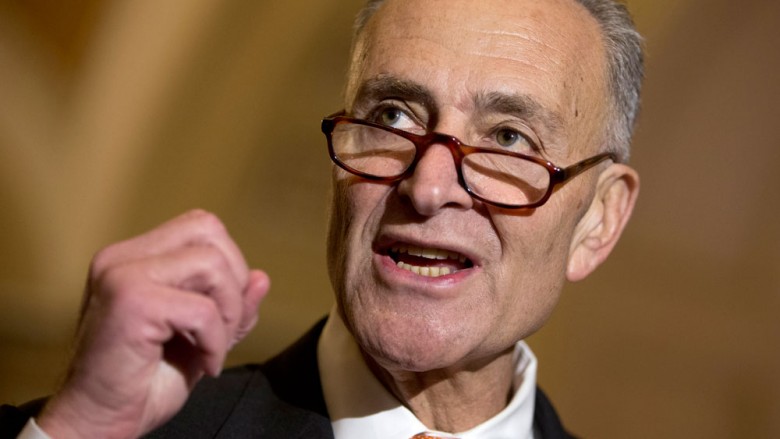Policy fights, funding battles still pose shutdown threat
By Associated Press | November 4, 2015, 6:11 EST
 Sen. Charles Schumer, D-N.Y. talks to media on Capitol Hill in Washington. (AP Photo/Carolyn Kaster)
Sen. Charles Schumer, D-N.Y. talks to media on Capitol Hill in Washington. (AP Photo/Carolyn Kaster) WASHINGTON (AP) — Despite a broad budget deal, the White House and congressional Republicans must resolve dozens of policy issues and spending fights if they are to avoid a holiday season government shutdown.
Hot-button battles over Planned Parenthood, the environment and money for agencies like the IRS could still derail a must-do spending bill to keep the government running.
The goodwill that emerged from the bipartisan budget-and-debt bill that President Barack Obama signed into law on Monday could be short-lived as GOP leaders look first to sooth the feelings of rank-and-file Republicans opposed to the underlying budget pact. GOP leaders like Speaker Paul Ryan appear to be under pressure to show some fight and avoid getting steamrolled by Democrats and Obama, who bring plenty of leverage to the talks.
Filling in the details of $66 billion in additional spending for the Pentagon and domestic agencies — and sorting out dozens of policy battles — give a divided, dysfunctional Congress plenty of chances to stumble.
At issue is a $1.1 trillion-plus catchall bill to ensure the government stays open. Spending amounts are relatively easy to sort out, helped in great measure by the extra billions of dollars.
However, Republicans who control both the House and Senate are sure to try to squeeze agencies like the IRS and the Environmental Protection Agency, while Democrats will defend domestic departments and press priorities such as infrastructure grants, pre-school education and money for local police and other first responders.
And then there’s Planned Parenthood. Tea party Republicans are insistent on stripping the organization of its federal funds because of its practice of collecting and distributing fetal tissue for scientific research. Former House Speaker John Boehner’s refusal to risk a government shutdown over Planned Parenthood money was the precipitating factor in his being forced out last month.
Also troublesome are dozens of GOP policy provisions that seek to reverse a slew of regulations issued by the Obama administration, including limitations on carbon pollution from coal-fired power plants, new clean water rules and financial restrictions from the Consumer Financial Protection Bureau established in the 2010 overhaul. Also in the cross-hairs is a Labor Department rule that would require brokers giving advice on retirement accounts to act in their clients’ best interests.
“The power of the purse rests within the legislative branch and we fully expect that we’re going to exercise that power,” Ryan, R-Wis., told reporters Tuesday at a Capitol Hill news conference.
In past negotiations, Republican efforts to attach divisive policy “riders” to the spending bill have been thwarted not only by Obama’s veto threats but Democrats who ran the Senate.
The balance of power has shifted.
“It’ll clearly go better because we do hold the Senate,” said Rep. Tom Cole, R-Okla., who chairs the panel responsible for contentious labor, health, and education issues. Still, Cole added, “the ones that have the best chance to make it will be ones that actually have some Democratic support as well. Not all these things are simply partisan.”
Pro-business Democrats have twice helped block tighter regulations on the length of workweeks for truckers, while more ambitious GOP efforts to blunt clean air and water regulations have fizzled. Cole says Democrats are interested in attacking the new rule on retirement advice, which could make it part of the spending bill.
And even though Democrats lost the Senate last year and are down to 188 members in the 435-seat House, they retain significant leverage inside the talks that will produce the spending bill since their votes will be needed to pass it.
“It’ll be very difficult for us to get more of our policy riders into the legislation, into the omnibus, if few of our members intend to vote for the bill,” said Rep. Charlie Dent, R-Pa.
Then, of course, there is the role played by the administration, which has final veto power.
It all adds up to a significant advantage for Obama, who won most of the additional spending he sought in last week’s budget deal and looks to carry the day on the spending bill that would implement it.
A key question is how tea party lawmakers — who have given Ryan breathing room so far — would react if negotiations result in a spending bill without major victories for the GOP on policy. Ryan could feel pressure to hang tough in the negotiations in hopes of securing late-stage concessions, though that could risk a government shutdown if an impasse occurs and hard feelings develop.
“You know just playing chicken with the president of the United States is not responsible. It’s not good leadership and I would hope that he would not pursue that,” Rep. Steny Hoyer of Maryland, the No. 2 House Democrat, told reporters Tuesday.
— Written by Andrew Taylor
Copyright 2015 The Associated Press. All rights reserved. This material may not be published, broadcast, rewritten or redistributed.










